With a growing middle class, early-stage frontier markets, enormous demographic advantages, and its ongoing digital transformation, Africa continues to grow in both economic and geopolitical importance. In “Demystifying Africa’s Risk Perception Premium,” Paul Clyde and co-authors make the case for a stronger U.S.- Africa trade and investment relationship, one that changes the narrative around doing business on the continent.
This primer provides a comprehensive but non-technical overview of the distinct health information systems (HIS) that all together support health care delivery in low-resource settings. It opens with a historical account and landscape assessment and describes the urgent need to build a lean rigorous HIS that integrates these different components. Subsequent sections describe the individual systems that: i) track individual patient and health care provider information; ii) directly document care delivery; iii) provide public and population health data; iv) support facilities’ and community health workers’ administrative and financial functions; and v) coordinate logistics and health commodities supply chains. A separate section describes imported data, including “master data” and manufactured (e.g., “meta”) data. The primer closes with recommendations for principled HIS stewardship.
The global reproductive health community is increasingly seeking to engage the private sector in meeting the needs for reproductive health in low-resource regions of the world. Countries such as Malawi in Eastern Africa have a high level of donor dependence and market conditions which inhibit commercial sector development, particularly for serving the more rural and remote areas.
In this project, WDI’s Healthcare team conducted a contraceptives distributor landscape analysis and delivered actionable and stakeholder receptivity-tested concepts for stimulating the private sector provision of family planning products and services in rural, remote and other underserved populations. The landscaping assessment involved field research and in-country discussions with market actors, but also utilized a stakeholder-centric methodology to generate ideas for market building. The results and recommendations are being shared with Malawi country stakeholders, as well as with funders and implementers for potential market building efforts, in Malawi and similar countries.
Sally Stephens, the Feb. 12 WDI Global Impact Speaker and chief business officer of Medicines360, the only nonprofit pharmaceutical company with a marketed product in the U.S., sat down for a one-on-one interview while on campus. (Watch the interview below.)
Stephens was interviewed by Andrea Bare, senior advisor with WDI’s Healthcare focus area, who talked with Stephens about a number of the organization’s operations. Stephens detailed Medicines360’s origin, its business model and how it operates, its approach to partnerships, how the U.S. market compares to sub-Saharan Africa and what the future holds.
Regarding partnerships, Stephens told Bare that Medicines360’s approach is to “partner if someone has the expertise that will help us meet our mission,” she said. “We saw a lack of expertise in the U.S. public sector, so we developed that expertise.”
She said the same “myths and gaps” exist in both the U.S. and sub-Saharan Africa markets. For the future, Stephens said, Medicines360 will “focus on broadening our impact.”
“It is all about access for us,” she said.
Medicines360 has a unique mission-driven business model and an innovative partnership with Allergan. As its name implies, Medicines360 has a global focus and is driven to meet an unmet need for women around the world, including in the U.S. That is, affordable, long-acting contraceptives.
Its first product is a hormonal intrauterine device, or IUD, which had been out of reach for many women because of the high cost of the sole brand on the market. Medicines360 offers its FDA-approved Liletta at a discounted price to public sector clinics across the U.S. to increase access to this important family-planning product.
Additionally, Medicines360 has been working with international health organizations to offer the product, branded as Avibela in low- and middle-income countries, to also increase access to these markets. Avibela was launched in Madagascar in 2018. Sales of Liletta in the U.S. help fund research and development efforts by the company to bring contraceptives to countries such as Madagascar.
Stephens, who joined Medicines360 in 2011, leads the corporate strategy, business development, marketing and sales, and the developing countries programs at the organization.

In sub-Saharan Africa, the private sector is a common provider of family planning solutions, used by almost 40 percent of women in the region. But this isn’t the case in Malawi.

Andrea Bare

Erika Beidelman
To find out why, we spent two weeks in-country this past September, exploring Malawi’s private sector landscape for family planning and reproductive health commodities through work sponsored by the Reproductive Health Supplies Coalition’s Innovation Fund, in a project titled “Total Market Approach: Private Sector Distributor Landscape Analysis.” This project is a part of larger efforts to expand access to contraceptives by utilizing the private sector in Malawi (and countries like it) that have historically been dominated by donor-funded commodities. This work will seek to develop recommendations on how the private sector may be expanded in settings like Malawi.
Accompanied by a local pharmacist, we were able to engage in conversations with wholesalers, private retailers, social marketing and faith-based organizations, manufacturers and government representatives, allowing us to gain a “total market” view of Malawi’s current family planning provision. Through this, we witnessed a family planning market dominated by free, public-sector products, alongside a capable yet under-utilized private sector. During our many conversations with key stakeholders in the country, we observed five crucial environmental and policy-related factors that may be directly contributing to the private sector’s ability (or lack thereof) to provide family planning commodities. While we saw this in our visit to Malawi, it may apply to other countries with long histories of donor-funded healthcare.
Malawi has a population greater than many of its African neighbors, including Zambia and Zimbabwe, yet it represents a challenging market. In 2017, the World Bank estimated that 83.2 percent of Malawi’s population lives in rural and hard-to-reach areas. And World Bank measures from 2016 estimated that over 50 percent of the population lives below the national poverty line. These combined factors show that only a limited portion of the population may actually have the ability to pay for and access contraceptives provided in the private sector. Low levels of visible demand for family planning may then prevent private sector actors from investing more into the provision of these products.
All Malawians, regardless of ability to pay, are able to acquire their contraceptives free-of-charge in the public sector – or for a very modest service fee from NGOs and faith-based organizations. This severely limits the private sector’s ability to attract customers for family planning products, even among those who do have the ability to pay. Additionally, all of Malawi’s public sector family planning commodities are donated to the country through larger procurement entities like USAID and UNFPA, which often source each contraceptive product from a single manufacturer. This means Malawi is greatly impacted by global product shortages – as illustrated by the widespread shortages of Depo-Provera that we saw and heard about during our travels. And because the private sector market is not well-developed for these critical products, there may not be a back-up option for women when the public sector is experiencing stock-outs, particularly in the rural areas of the country.
Perhaps due to the public sector’s free provision of family planning, the primary health insurance schemes in Malawi do not include contraceptives as a covered service. This challenge, also evident in other countries, may work to force Malawians (even those with an ability to pay) to use the public sector, because they cannot get a portion of their services covered by their insurance. On a visit to one of Lilongwe’s well-regarded private clinics, the sole gynecologist described how even his regular patients seek their contraceptives from public clinics rather than pay out of pocket.
While speaking to wholesalers across Lilongwe, we found reports of retailers charging up to 100-200 percent margins on many products, including family planning. No regulations currently exist to limit the sometimes-excessive margins that private sector retailers are prone to charging. Exorbitant prices may then work to place the private sector as only a “last resort” outlet for many products. The underlying cause of high margins may be pharmacy operating costs, such as the challenge we heard regarding the difficulty of retaining skilled pharmacists, a profession in relatively short supply in Malawi.
Poverty rates and donor presence lead to cautious manufacturer views on the private market opportunity for contraceptives. We heard concerns that contraceptive manufacturers may perceive that the costs of bringing products to Malawi are greater than the potential market returns – significantly reducing the contraceptives available for wholesalers to supply. A focus on the development of funded demand by government and NGO players may help to incentivize the private sector to bring product to the Malawian market. To take one example, the Malawi government’s “Buy Malawi” campaign, which prioritizes medicine purchases from local manufacturers (for a selection of products), could help ensure a market – if manufacturers were to invest in local production capacity. With appropriate methods of demand generation and market segmentation, Malawi has the opportunity to achieve the same market appeal as some of its neighbors.
Despite these barriers, we noticed that many actors within Malawi’s private sector (both wholesalers and retailers alike) are ready, willing and able to provide contraceptive products when a strong market need is evident. For example, within Malawi’s public sector it can be difficult for women to access emergency contraception due to stock-outs, stigma or long travel and wait times. The private sector has responded through a consistent supply of emergency contraception, with at least three wholesalers providing it, and two more currently working on registering the product for sale in the country. Retailers and wholesalers perceive emergency contraception as a fast-moving product with tremendous market opportunity. Here we can see that when free product is not at the forefront, the private sector has the ability to step in and fill the gap.
If development efforts wish to prepare countries and their private sectors for eventual reductions in global funding, we need to focus more attention on how past (and current) development efforts may inhibit the private sector from fully developing and serving populations that are able and willing to pay.
Andrea Bare is a Senior Advisor with the William Davidson Institute at the University of Michigan.
Erika Beidelman is a Research Associate for the Healthcare sector at WDI.
This article was originally published on NextBillion.net, which is managed by WDI.
WDI is part of two separate grants awarded by the Reproductive Health Supplies Coalition (RHSC) Innovation Fund, the organization’s flagship initiative to spur and finance promising new ideas and strategies. The coalition, which is the largest network of reproductive health organizations, aims to ensure that a range of quality reproductive health supplies are available equally to all people who need them regardless of income.
Both grants were awarded in March at RHSC’s meeting in Brussels. The first grant was awarded to WDI’s Healthcare Initiative to study and make recommendations to improve commercial distribution of family planning products in remote and underserved populations in low- and middle-income countries (LMICs).

Andrea Bare
The project, “Total Market Approach: Private Sector Distributor Landscape Analysis,” is being funded by the RHSC, a global partnership of public, private and non-governmental organizations dedicated to ensuring that all people in LMICs can access and use affordable, high-quality supplies to improve reproductive health. It will be led by WDI Senior Advisor Andrea Bare and Research Associate Erika Beidelman.
Historically, low-income people living in rural areas have less access to family planning products and services partly due to market distribution barriers. Social marketing organizations (SMOs) play a vital role in improving access to, and choice of, an assortment of family planning products at a variety of prices in underserved markets. SMOs provide product-based contraceptive social marketing programs, which are funded in part by donors, making products and/or services subsidized. As donor support begins to phase out and SMOs pursue transition to greater sustainability with less dependence on subsidies, existing distribution models will be impacted.

Erika Beidelman
Global indicators suggest that the donor resource base for family planning supplies will decrease in the future, widening the existing funding gap. Further complicating the market, demand will continue to grow as countries strive to meet global family planning goals by 2020 – increasing total commodity costs required to meet women’s needs. A RHSC gap analysis showed that in 135 LMICs there will be a $238 million funding gap in 2018 which will grow to $290 million for 2020. For the years 2018-20, the combined funding shortfall is estimated to be $793 million. WDI’s research project will address the urgency of engaging the private sector and commercial distributors as part of the global effort to address the widening funding gap and ensure availability of family planning products.
Bare and Beidelman will take an in-depth look at Malawi as an example country with high donor involvement, strong SMO presence and limited commercial presence. They will then contrast what is occurring in Malawi with countries such as Vietnam, Cambodia, Guatemala or Morocco where donor funds and SMO presence are lower and the commercial distribution sector is more mature. This assessment will map what is currently working and not working for commercial distributors, with insights into their current business and service models, barriers to participation and opportunities for improvement.
By examining Malawi against the other countries, market needs, policy conditions and opportunities can be identified to foster commercial investment and participation within the distribution sector. WDI researchers are then able to develop a set of hypothetical solutions to remedy the challenges and “concept test” them with stakeholders.
The goal is to deliver a final set of potential, recommended solutions for increasing the role of the commercial sector in family planning products distribution to rural and other underserved populations.
WDI has partnered with RHSC on a past project. In 2017, WDI, RHSC and the U.S. Agency for International Development (USAID) collaborated on Market Bookshelf, an easy-to-navigate online platform to facilitate the dissemination and sharing of global health market knowledge. The goal of the platform is to increase returns on donor and other stakeholder-funded research and help advance global health objectives through knowledge-sharing.
In the second project funded by RHSC’s Innovation Fund, WDI will partner with VillageReach on a six-month project to help improve reproductive health supply chains to increase the availability of family planning products.
Many LMIC governments own and directly operate thousands of public health clinics, and spend money to get health commodities out to the clinics. But this becomes a big challenge to reliably get products out there. As a result, governments have paid more attention to more effectively design well-functioning supply chains that align with health policy.
But designing efficient and effective supply chains often requires specialized software and data-intensive analyses, which can be expensive and difficult to manage in LMIC healthcare settings. Additionally, reproductive health commodities are unique because of the need to provide multiple product options to ensure that women are able to choose the products that best suit their specific needs.
WDI developed two different tools to simplify the process of supply chain design by addressing these software and data needs challenges. Both tools use Microsoft Excel, which is widely available, and are designed to operate without requiring intensive data collection.
The first tool uses benchmark and proxy data to help health program managers quickly estimate the cost of operating their supply chain. It can also be used to examine the cost impact of any design changes they are considering, such as delivering products more or less frequently, or integrating family planning product deliveries with other types of products, like HIV malaria medicines.
“The tool allows health program managers to quickly explore these types of supply chain design questions at a high level – questions that would otherwise require a difficult and resource-intensive analysis,” said Michael Krautmann, a senior research associate for the Healthcare Initiative.

Michael Krautmann
The second tool is more strategic in nature, helping health system leaders quickly assess a wide range of factors in their country that affect supply chain performance – geography, politics, financing, human resources – and identify the types of supply chain strategies that are most aligned with that context. Again, WDI helped minimize barriers to using the tool by designing it in Excel and using data that already exists in the global health space. Together these tools allow governments or donor agencies to quickly get answers that aid in improving supply chain design.
WDI and VillageReach have been longtime partners. VillageReach has supported the work of several WDI summer interns, and the Institute’s Healthcare Initiative partnered with the global nonprofit from 2014-16 to enhance vaccine supply chain performance by evaluating mechanisms to improve accountability of vaccine program staff in three provinces in Mozambique.
Also announced at the Brussels meeting was Bare’s election as chairwoman of the RHSC’s Market Development Approaches Working Group (MDAWG). As one of RHSC’s several mechanisms through which coalition members collaborate, MDAWG is focused on the “total market,” striving to facilitate wider private sector involvement and overall market growth. RHSC uses these working groups, along with several caucuses, to bring members and partners together to build sustained, coordinated action toward specific and agreed-upon goals.
Bare’s two-year term involves several duties, including pursuing the objectives of MDAWG to:
Bare will work closely with RHSC secretariat staff to provide leadership for the group’s workstreams and activities, to ensure the visibility of its work both internally and externally and to collaborate with other RHSC working groups.
“I am grateful for this opportunity and excited to work my coalition colleagues in MDAWG,” Bare said. “Through our individual organizations and together as a group, we aim to contribute to the private sector’s development and sustainability in order to increase reproductive health access and supply security.”
Homepage image credit UNFPA Flickr
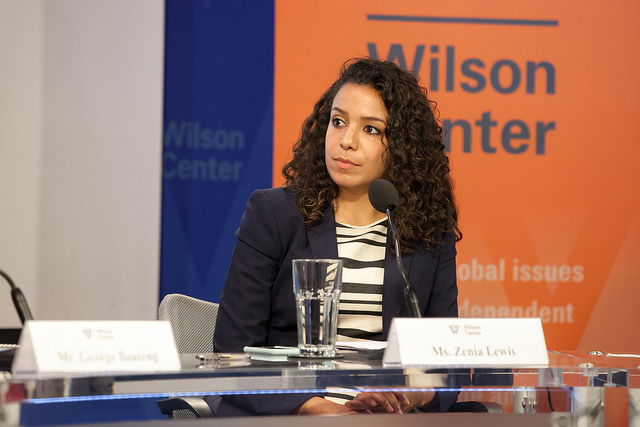
Zenia Lewis speaking on a panel at the Wilson Center on Africa.
Zenia Lewis’ 2008 summer internship in Malawi was supposed to be an opportunity for her to build upon what she had learned during her first year of a master’s degree in public policy from U-M’s Ford School, acquire a few new skills, and also experience working in a different cultural setting.
As expected, Lewis left Malawi 12 weeks later with several semesters worth of lessons. They just weren’t the ones she was anticipating.
As part of WDI’s Global Impact Summer Internships, Lewis arranged to spend three months working for the Malawi Rural Finance Co. The MRFC, for short, helps poor farmers and other small scale entrepreneurs by providing new kinds of access to savings and credit. It had intended to launch a new savings product to a group of interested farmers.
Lewis and others at MRFC planned to gather and analyze data on the individuals who opened these accounts, including well-being indicators such as income, health, and child education to measure the positive effects of the company’s work. They also had plans to roll out new biometric identification software, a modern-day credit bureau for tracking creditworthiness of clients who often lack official credentials and therefore are unable to secure loans or must pay higher interest rates to get one.
It all looked good on paper, but the roadblocks and challenges for Lewis started almost as soon as she arrived in the capital city of Lilongwe. First, many of the farmers who were supposed to participate in the new savings product backed out at the last moment due to a variety of cultural concerns. Then, delivery of the new software and hardware was delayed.
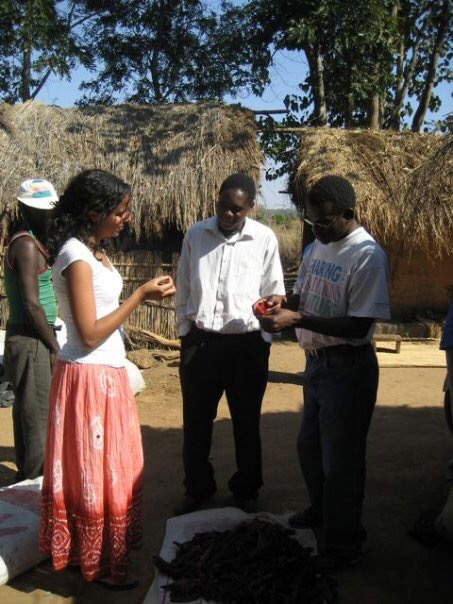
Lewis speaks with a paprika farmer in Malawi during her internship.
On top of those issues, MFRC’s offices had frequent power and internet outages as well as an insufficient number of computers, all of which stunted productivity. Lewis turned all of the issues into lessons.
“Learning early on that things can go completely awry in the field and take much longer than anticipated…was probably one of the most useful things I could learn for understanding the work I would do later in my career,” Lewis said. “It also taught me to be innovative, and to come up with new plans and solutions.
“It all served as a valuable lesson for later when doing research and working with partners in Africa because I understood firsthand many of the challenges they faced.”
Lewis adapted to her surroundings and circumstances. She took advantage of the delays and power outages to conduct face-to-face interviews with government officials and high-level individuals in the banking sector on how to improve microfinance policy and the feasibility of establishing a microfinance credit bureau in the country. She also went on field trips to more remote parts of Malawi to help improve loan collection and meet different small-business clients.
Along with the professional lessons, there were some personal enlightenments as well. For one, she discovered she didn’t like to be idle. So she began writing a blog, charging her laptop when the power was on and writing when there was a power outage.
“I learned that I actually enjoy adapting to new environments,” Lewis said. “I like challenging work situations that involve creatively coming up with solutions and I enjoy getting to know new cultures.”
Lewis took all her new wisdom into her professional career after graduation.
She began working for the Brookings Institution in Washington, D.C. and its Global Economy Program’s Africa Growth Initiative. She initially applied for a job there focused on Latin America, but the position had been filled. But when Brookings saw her experience in Malawi, it offered her a position with the Africa initiative. Lewis joined as a research analyst involved in a range of topics from political and governance issues to natural resource management – especially oil and gas – to trade and regional integration. She traveled to Ethiopia and Zambia for annual U.S.-Africa economic forums, and also worked on a project focused on the effects of oil and gas discoveries on local communities in Uganda.
Lewis left Brookings after nearly four years to move to Tunisia and work for the African Development Bank (AfDB) on a trade finance project that supported African banks lending to local small- and medium-sized enterprises that traded internationally. While there, she soon learned of a new position at AfDB in Washington working with the African Union and African ambassadors on engaging with the U.S. government on African development policy-related issues. She took the job and worked on several projects for about two years before leaving to volunteer in Lebanon assisting Syrian refugees.
Recently, Lewis got married and moved with her husband to Vienna. She is working on various consulting projects focused on African development issues, and is looking for a full-time position.
Wherever she lands, Lewis said she will bring with her the lessons learned from her summer in Malawi. She said she has often reflected on the challenges and hardships she endured during her internship whenever encountering tough times in her professional work.
“There have been some times when I’ve had to travel for work and experienced one chaotic thing after another and thought back to some of the challenges of that summer internship and reminded myself that it’s manageable and all will be fine,” Lewis said. “Also, when projects have had different roadblocks or not gone as planned, it’s been useful to think back and know that what can seem like a setback can actually be another opportunity or reveal useful insights for better implementing the project.”
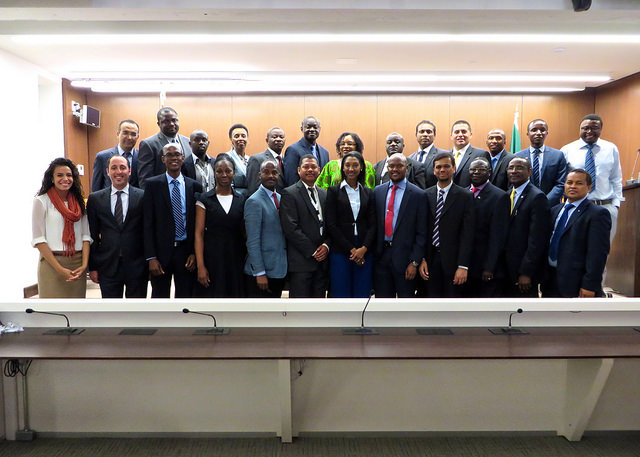
Lewis, far left, with officials from African embassies who attended a trade & investment session in Washington, D.C. organized by Lewis when she worked for the African Union.
Note: This is one in an ongoing series of articles profiling past WDI interns and Multidisciplinary Action Project (MAP) team members and their career paths. Additional profiles in the series may be found here.
As the academic year comes to a close, the 13 MAP teams organized and funded by WDI have finished their projects and successfully delivered final reports to their sponsoring organizations.
Multidisciplinary Action Projects, or MAP for short, is an annual, action-based learning course offered at the Ross School of Business in which MBA students work on projects for organizations all over the world under the guidance of faculty advisors. Each project requires analytical rigor, critical thinking, and teamwork among students. Sponsoring organizations receive first-rate deliverables and data-driven recommendations from the teams of students. (Learn more about this year’s MAP projects organized by WDI here; find more information on WDI’s MAP projects over the years here.)
After learning about their projects and conducting secondary research for several weeks, the students then spend two to four weeks working with their organizations in the field.
Two of those projects – in Hanoi, Vietnam and Madurai, India – focused on laying the groundwork for centers designed to support local entrepreneurs and are part of a joint effort between WDI and the Zell Lurie Institute (ZLI). To assist the students on their projects, WDI Education Initiative Vice President Amy Gillett and Program Coordinator Nathan Rauh-Bieri provided advice and guidance based on WDI’s prior work in entrepreneurship development (see WDI’s newly-launched Entrepreneurship Development Center).
Here is a recap of the two projects.
The Vietnam Partners MAP project was co-funded by ZLI, and hosted by Vietnam Partners, LLC. The project’s goal was to create a launch plan for an entrepreneurship service center in partnership with Hanoi Business School (HSB). The student team conducted more than 45 interviews with entrepreneurs, HSB administrators, and other stakeholders. They discovered that Vietnam’s entrepreneurs need help growing their business – not just starting them – and would welcome an entrepreneurship development center.
“The environment in Vietnam is ripe for this kind of organization,” said Bradley LaLonde, the team’s supervisor at Vietnam Partners.
At the end of their project, the students presented a business plan for a Center for Entrepreneurship and Innovation at HSB. The team identified a local hunger for practical rather than theoretical training, and training customized to the local ecosystem. More specifically, the MAP team identified a lack of local business cases. After a conversation with WDI, the MAP team suggested that a sustained effort around creating local cases, similar to WDI’s Philippines Case Collection, could be high-potential way to train Hanoi’s practice-hungry entrepreneurs.
Team member Juan Recalde said the project taught him that entrepreneurs have different needs.
“That was a very important learning because we could segment different types of entrepreneurs and based on the segmentation, determine which segment to target,” he said.
Recalde said he will take what he learned – specifically market research and creating a launch strategy for an entrepreneurship development center – and try to replicate it in his hometown.
“Formosa is one of the poorest provinces of Argentina and the government plays a big role in the economy, while the private sector is small,” he said. “I believe that entrepreneurship is the answer to the growth issues that my province faces.”
Stewart Thornhill, executive director of ZLI and the team’s academic advisor, praised the team for how well they represented U-M, WDI and ZLI and for their mature analysis of the project.
“They didn’t treat entrepreneurs as a generic class, but were able to identify specific personas,” he said. “Their in-depth qualitative research will serve this center’s clients well in the future.”
WDI President Paul Clyde, who also advised the team, said they gave Vietnam Partners good insights into the current situation with the country’s entrepreneurs.
“There is no substitute for having information from people who have spent time on the ground to get a good feel for what is going on,” Clyde said. “This is exactly the type of situation in which MAP projects are effective tools for us and for sponsors.”
The MAP team, based in Madurai, India, was tasked with setting up a business model for Aparajitha Foundation to provide services to the city’s Madurai’s micro, small, and medium enterprises – or MSMEs. This work builds on last year’s MAP project with Aparajitha.
The student team’s final report outlined the gaps in the entrepreneurial ecosystem in Madurai, the market opportunity, business model, financial model, implementation plan, and key learnings. The team recommended that GROW, a conceptual organization to meet the needs of growth-stage entrepreneurs, be launched. The students also provided an outline of what was needed to have GROW operating within two years and expand to a second locale within five years.
Clyde, the team’s academic advisor, lauded the students’ efforts.
“They were able to get up to speed quickly on the current situation and combined that with some careful thinking about different models for providing services to entrepreneurs,” he said. Aparajitha “has already made significant progress in (its) engagement with the entrepreneurs in Tamil Nadu.”
The project left a definite impression on team member Nancy McDermott, who, though having a background in the community development aspects of business, experienced “what a big impact supporting entrepreneurs locally has on the local economy.”
Particularly, the project’s scope exposed her to how entrepreneurship can “spark job creation at a grassroots level,” she said, adding that she saw “what a big impact this is having on Madurai’s economy, and what kind of impact it can have on other economies as well.”
This summer, a WDI intern will pick up where the student MAP team left off and develop diagnostic tools that will identify the challenges a given entrepreneur faces and thus how GROW can work with the entrepreneur most effectively.
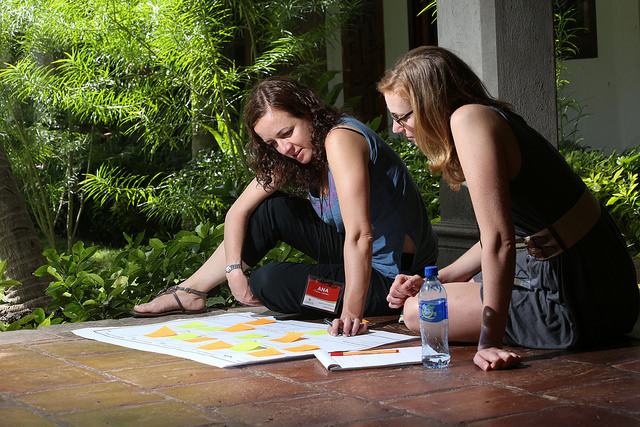
Mary Fritz, pictured right, in Nicaragua for Agora Partnerships.
When Mary Fritz thinks back to her 2012 WDI summer internship in India, she remembers the oppressive heat, the bugs, her illnesses, her inability to communicate, a lack of cultural context, being the constant object of fascination of the locals and taking a shower by pouring water over her head. In short, Fritz said, she was “missing my U.S. life.”
So it might be surprising that Fritz, who has since built a young career helping launch startups in Latin America, fondly refers to this time as an “amazing, multifaceted experience that really shaped me on a lot of levels.” She said her summer in India made her stronger and more independent, flexible, and patient.
“India is extraordinarily beautiful and diverse, and farther removed from Western culture than I had ever been before,” Fritz said. “I learned to be constantly (both) physically and emotionally, uncomfortable. I learned how to be alone. I learned to take bucket showers. I learned a little bit of Hindi.”
Along with the life lessons were plenty of business lessons as well.
“I learned the importance of including the customer in every strategic decision,” she said. “I learned humility. I learned how to connect with people without shared language. And I learned that sometimes you just can’t.”
At the University of Michigan, Fritz enrolled at the Erb Institute, a dual degree MBA/MS program with the Ross School of Business and the School of Natural Resources and Environment. She said she chose U-M for her graduate studies because of the university’s commitment to impact. She also was familiar with WDI’s support of student programs before arriving on campus.
“I’ve always been really interested in social enterprise as a way to address social, economic, and justice issues,” Fritz said. “I wanted to learn what really goes into building an impact company from the ground up, and WDI gave me that opportunity.”
Fritz worked with the social enterprise Wello, which makes water transportation products, including the WaterWheel, designed to help mostly low-income women collect and carry water long distances. Founded in rural India by Cynthia Koenig, a former WDI summer intern as well, Wello has now expanded to Pakistan, Malawi, Zambia, Bangladesh, and Haiti.
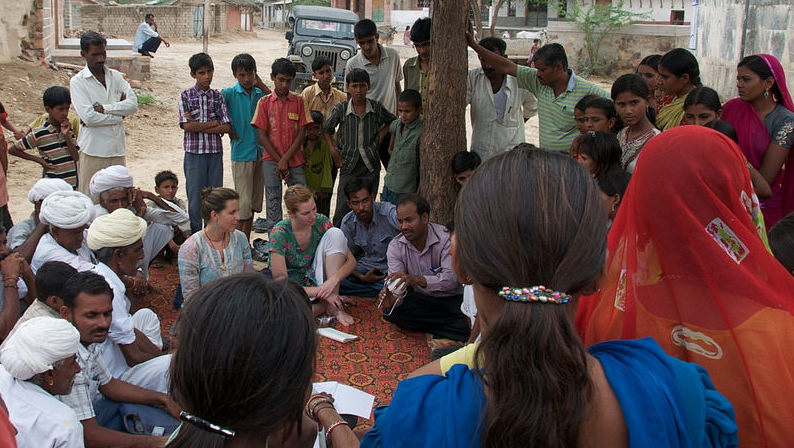
Mary Fritz, wearing a green shirt and white pants, speaks with potential Wello customers. She is seated next to Cynthia Koenig (pictured left), CEO of Wello.
Fritz was based in Mumbai, with frequent travel around the Indian states of Rajasthan and Gujarat. Because Wello was a fledgling startup with a small staff, Fritz worked on a bit of everything. But her main focus was how to get the product to the people who needed it at a price they could afford. There were a lot of manufacturing details to work out, as well as market research and customer interviews to conduct, pricing models to build, and distribution channels to develop. She also studied how to measure impact.
After graduation, Fritz took those valuable lessons and work experiences and began building and launching startup organizations focused mostly on Latin America for Agora Partnerships, a business accelerator. She recently moved to Seattle to work for Lenati, a marketing and sales strategy consulting firm. She will continue to work with startups and nonprofits as well as corporate clients.
“My experience with Wello has definitely influenced my career choices,” Fritz said. “From a functional standpoint, I became really interested in everything that’s involved in bringing a product to market. And I loved working in a startup; every day is different.”
And more than four years removed from that summer in India, Fritz said she still harkens back to those days when faced with a current-day challenge.
“Wello was my first, and definitely most intense, experience conducting customer research and trying to create a human-centered approach to a go-to-market strategy,” she said. “I use those lessons all the time.”
And despite the hardships of that sometimes uncomfortable summer in a faraway land, the internship nevertheless stoked a yearning to work internationally.
“From a personal standpoint,” Fritz said, “it definitely increased my desire to travel and experience cultures beyond my own.”
Note: This is one in an ongoing series of articles profiling past WDI interns and Multidisciplinary Action Project (MAP) team members and their career paths. Additional profiles in the series may be found here.
VillageReach improves access to healthcare for remote, underserved communities worldwide. It partners with governments, businesses, non-profits, and other organizations to improve the performance and reliability of health systems in the most inaccessible and isolated communities. Student intern Jodi-Ann Burey worked with VillageReach on organizational development and capacity building in Malawi.